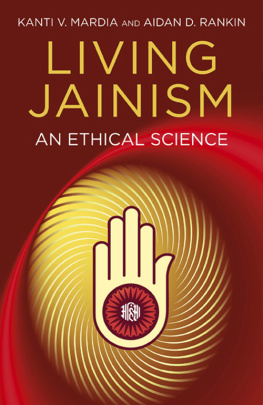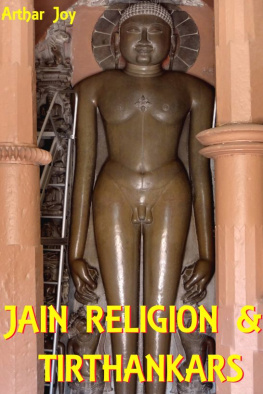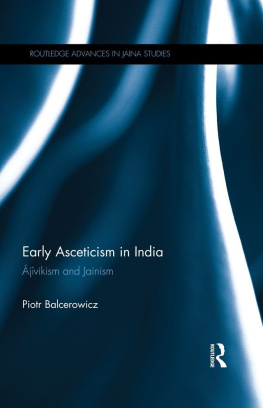WHAT PEOPLE ARE SAYING ABOUT
LIVING JAINISM
A remarkably comprehensive explanation of the Jain philosophy of the interconnectedness of being and its significance for our approach to the environment drawing on the principles of interdependence and reverence for life. Truth is presented as not only one-but also many-sided, opening up interfaith dialog and an attitude of non-violence relevant to the modern human predicament. The book encourages us to develop relationships based on co-operation, compassion and trust. Jainism is presented as a philosophy to rein in the materialistic and exploitative trends of modern life and overcome our sense of separation from Nature and each other. The book is also hopeful of human possibilities and presents an expanded view of perception and logic. Essential reading for anyone interested in the philosophy and implications of Jainism for our time.
David Lorimer, Scientific and Medical Network
Another profound and beautiful book from Aidan Rankin and his co-author. Their exquisite scholarship and love of Jainism emanates from every page; and brings the wisdom and modern-day application of this ancient but highly relevant ecological spirituality to a modern readership. Their focus on personal ecology is timely, compelling and accessible. I cannot recommend this book more highly.
Rev Lynne Sedgmore, CBE, CEO, 157 Group of FE Colleges
An outstanding book from two very talented scholars of Jain philosophy and wisdom. It tackles a very complex and important topic, demonstrating the vast depth of Jain science and metaphysics.
Dr Atul K. Shah, CEO, Diverse Ethics Ltd
First published by Mantra Books, 2013
Mantra Books is an imprint of John Hunt Publishing Ltd., Laurel House, Station Approach,
Alresford, Hants, SO24 9JH, UK
www.johnhuntpublishing.com
www.mantra-books.net
For distributor details and how to order please visit the Ordering section on our website.
Text copyright: Kanti V. Mardia and Aidan D. Rankin 2013
ISBN: 978 1 78099 912 8
All rights reserved. Except for brief quotations in critical articles or reviews, no part of this book may be reproduced in any manner without prior written permission from the publishers.
The rights of Kanti V. Mardia and Aidan D. Rankin as authors have been asserted in accordance with the Copyright, Designs and Patents Act 1988.
A CIP catalogue record for this book is available from the British Library.
Design: Stuart Davies
Printed and bound by CPI Group (UK) Ltd, Croydon, CR0 4YY
We operate a distinctive and ethical publishing philosophy in all areas of our business, from our global network of authors to production and worldwide distribution.
Foreword
Jainism is one of the most important spiritual and religious traditions in the world and one of the oldest, with its origins going probably well back over 2500 years. Perhaps most notably, Jainism has a many-sided literature as extensive as that of any other of the worlds great religions, including art, science and mathematics, though most of it has not been given its proper study or rightful place in world thought.
Though the number of its current adherents may be relatively small, somewhat like Judaism, Jainism has an influence far beyond its numbers. It has great philosophical and mystical traditions and its followers are usually well educated and highly cultured. Though it mainly has adherents in India, the orientation of Jainism has always been towards the whole of life, and it is now gaining respect throughout the world.
Yet Jainism has its own unique nature and teachings, which can be quite different from religion in the western sense of the term. Jainism is not a belief system, but rather a way of right relationship with the living universe that we are inherently part of. It is not based upon a theology of a Creator that we must all bow down to, but upon recognition of the sacred nature of all life. Jainism is a spiritual science or way of higher knowledge and should be treated as such, if we want to really understand and appreciate the great gifts of insight that it can bestow upon us.
Jainism is a religion of life and honoring life. For Jainism, life is perhaps more important and real than any concept of divinity. How we relate to life is our true religion, which implies how we act in our daily lives, not simply a seeking of salvation or going to a heavenly world after death. Jainism begins with the unity of life and asks us to discover the implications of that unity, and reorient our behavior accordingly.
Jainism takes this honoring of life into its interaction with other religions, and with human culture as a whole. Jainism does not spread by mere assumption of a belief, an emotion, or a change of outer identity. It helps us connect with the deeper powers of nature, which to a great extent must remain nameless and transcend any mere human language connotations. Jains do not proselytize or preach, but they do teach and do this by example and behavior rather than by promoting divisive or separatist doctrines.
Jainism places a great deal of emphasis on the conduct of right living, which means first of all respect for all living beings, more so than it does on promoting any system of thought or particular faith. For Jainism, ahimsa or non-violence precedes and is greater than any deity or act of worship, or even any outer seeking of knowledge. But true ahimsa does not simply mean avoiding overt acts of physical violence. It requires working to reduce the amount of harm, violence, division and conflict not only in the world but also in ourselves. Ahimsa means non-interference with the natural balance and allowing every aspect of life and nature its own place and dignity.
This means that Jainism is eminently an ecological religion, woven into the web of life. It teaches us how to honor the ecology around us, not simply as a naturalistic phenomenon but as part of a sacred reality. This is not just a matter of respecting the way in which nature works at an outer level. More than that, it implies a deep reverence for all creatures as the most basic form of worship. It rests upon allowing each aspect of nature its sacred space; a place where we do not interfere with it, but allow it to flower naturally and to its fullest capacity.
Jainism also teaches us how to manage our personal ecology, which is how we conduct our personal lives, especially the psychological environment that we create and sustain by our thoughts and actions. We may refrain from actual violence but may still not be helping the world, if we are projecting thoughts of anger, fear or desire. Jainism implies right cultivation of our own individual nature, of both body and mind, and this includes respect for how they work and not interfering with their organic function. This extends to our attitude to food, which is our most basic interaction with life, and this should first of all be free of violence.
For the Jain mind the soul is everywhere and there are innumerable souls throughout all of nature, including at very minute levels. Intelligence is part of the fabric of nature, not a human invention or social production. Our actions accumulate karmic matter that can cause harm and suffering, but can also be cleansed away by right thought and right action. There is a logic and a science as to how we can understand the karmas we are creating and reduce all negative karmas, like toxins, from our inner being. In this way, free of limitations and impurities, we can know the highest truth of life and consciousness.









